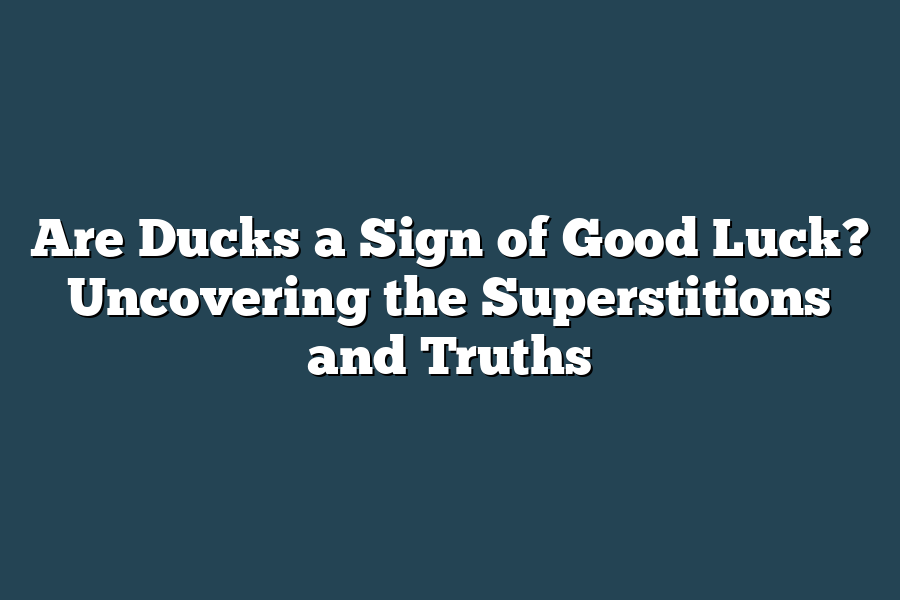Ducks are often considered a sign of good luck in various cultures and traditions around the world. In Chinese culture, ducks are symbols of happiness, fidelity, and success. Additionally, in Celtic mythology, ducks are associated with honesty and simplicity, bringing positivity and good fortune. Overall, while the belief in ducks as a sign of good luck may vary, many cultures view them as positive symbols.
Have you ever wondered if ducks bring more than just tranquility as they glide across a pond?
Ducks are not just feathered friends; they symbolize luck, prosperity, and renewal in cultures worldwide.
Explore with me as we uncover the truth behind the question: Are Ducks a Sign of Good Luck?
From Chinese symbolism to scientific perspectives, get ready to dive into a world of fascinating beliefs and truths.
Let’s begin!
Table of Contents
The Symbolism of Ducks in Chinese Culture – A Dive Into Fidelity and Happiness
It’s no secret that animals hold significant symbolism in various cultures around the world, and ducks are no exception.
In Chinese culture, ducks are revered for their representation of fidelity and happiness.
Let’s take a deeper dive into how these charming birds hold such symbolic importance.
Fidelity: The Sacred Bond of Ducks
In Chinese culture, ducks symbolize marital fidelity and loyalty.
Just as these waterfowls mate for life, they are seen as a representation of the unbreakable bond between partners.
Their faithfulness to their chosen mate mirrors the values of trust and commitment within relationships.
Ducks serve as a reminder of the importance of staying true to one’s commitments and standing by loved ones through thick and thin.
Happiness: The Joyful Nature of Ducks
In addition to fidelity, ducks are also associated with happiness and good fortune in Chinese culture.
Their jovial quacks and playful demeanor bring a sense of joy and lightheartedness to those who encounter them.
Ducks waddling gracefully across the water symbolize a carefree attitude towards life and the ability to find happiness in simple pleasures.
In Chinese folklore, ducks are often depicted as symbols of prosperity and auspiciousness, bringing luck and positive energy to those around them.
Cultural Significance
The symbolism of ducks in Chinese culture extends beyond just fidelity and happiness.
These water-dwelling birds are also associated with harmony, peace, and prosperity.
Ducks are believed to bring blessings of abundance and success, making them a popular motif in art, literature, and traditional ceremonies.
From their graceful movements to their vibrant plumage, ducks embody the essence of good fortune and positivity in Chinese symbolism.
Case Study: The Mandarin Duck
One of the most iconic representations of ducks in Chinese culture is the Mandarin duck.
Known for their striking beauty and vibrant colors, Mandarin ducks symbolize love, devotion, and harmonious relationships.
In Chinese folklore, Mandarin ducks are often depicted as a pair, highlighting the importance of companionship and mutual affection in relationships.
Their presence is believed to bring love and happiness to those who are seeking a harmonious partnership.
the symbolism of ducks in Chinese culture transcends mere ornithological fascination.
Ducks represent profound values of fidelity, happiness, and prosperity, offering a timeless message of love and joy.
Whether gliding gracefully across tranquil waters or adorning traditional artworks, ducks serve as enduring symbols of the beauty and harmony found in the natural world.
Embracing the symbolic essence of ducks can inspire us to cultivate deeper connections, find joy in simplicity, and embrace the blessings of fidelity and happiness in our own lives.
Ducks in Japanese Culture: Unraveling the Ties to Prosperity and Harmony
In Japanese culture, ducks hold a special significance beyond their cute appearance and charming quacks.
Let’s delve into how these feathered creatures are intertwined with concepts of prosperity and harmony in Japan.
Symbolism of Ducks in Japanese Folklore
Ducks in Japanese mythology are often associated with luck, happiness, and love.
They are viewed as symbols of fidelity and good fortune due to their monogamous nature and the way they care for their ducklings.
This symbolism is deeply rooted in Japanese folklore, where ducks are believed to bring blessings of wealth and prosperity to those who encounter them.
The Mandarina Duck: A Symbol of Prosperity
One particular duck species that stands out in Japanese culture is the mandarin duck.
Known for its vibrant plumage and elegant appearance, the mandarin duck symbolizes prosperity and marital happiness.
In Japanese art and literature, the mandarin duck is often depicted alongside a mate, representing a harmonious relationship and domestic bliss.
Ducks and Feng Shui: Bringing Luck and Abundance
In Feng Shui, the placement of duck images or figurines in the home is believed to attract good luck and abundance.
Ducks are associated with the element of water, which is linked to wealth and prosperity in Feng Shui practice.
By incorporating duck symbols into their living spaces, individuals aim to invite positive energy and financial success into their lives.
Case Study: The Kamo River Ducks
An intriguing real-life example of ducks symbolizing luck can be found along the Kamo River in Kyoto, Japan.
The Kamo River is home to a large population of ducks that are cherished by locals and visitors alike.
These ducks have become a symbol of the city’s natural beauty and cultural richness, adding to the atmosphere of tranquility and good fortune that permeates the area.
In Japanese culture, ducks are more than just adorable waterfowl – they are powerful symbols of luck, prosperity, and harmony.
Whether represented in mythology, art, or Feng Shui practices, ducks play a significant role in bringing positive energy and blessings into the lives of those who embrace their symbolism.
Next time you see a duck waddling by, remember the deep-rooted cultural significance it holds in Japan and the powerful message of good luck it carries with it.
Ducks in Western Cultures – Understanding the Connection to Purification and Renewal
When it comes to symbolism in Western cultures, ducks have long been associated with concepts of purification and renewal.
Let’s dive into the fascinating connection between these waterfowl and the positive energy they are believed to bring.
Ducks as Symbols of Purification
In many Western societies, ducks are seen as symbols of purity and cleanliness.
This association stems from the bird’s natural habitat in bodies of water, which are often linked to concepts of cleansing and washing away impurities.
Ducks’ ability to effortlessly glide through water adds to their image as creatures of purity, untouched by the dirt and grime of the land.
Ducks Representing Renewal
Beyond purification, ducks are also connected to the idea of renewal.
For centuries, these birds have been admired for their ability to molt and regenerate feathers, symbolizing a fresh start and the shedding of old negativity.
This cyclical process of renewal is seen as a positive omen in many cultures, signaling the opportunity for growth, transformation, and new beginnings.
Cultural Examples of Duck Symbolism
Across various Western cultures, ducks play a significant role in symbolic narratives.
In Greek mythology, ducks were associated with the goddess Aphrodite, who embodied love, beauty, and renewal.
Additionally, in Celtic folklore, ducks were revered for their connection to water spirits and the power of emotional healing.
Modern Interpretations
In contemporary society, the symbolism of ducks continues to resonate with many individuals seeking positivity and good fortune.
Whether displayed as art pieces, incorporated into home decor, or celebrated in festivals, ducks remain enduring symbols of hope, renewal, and the promise of better days ahead.
By understanding the profound symbolism of ducks in Western cultures, we can appreciate the deeper meanings behind these charming waterfowl and the positive energy they are believed to bring into our lives.
Debunking the Myth – Scientific Perspectives on Ducks and Good Luck
Ah, the age-old question: Are ducks really a sign of good luck, or is it just a charming folklore passed down through generations?
Let’s dive into the scientific perspectives on this quack-tastic topic to separate fact from fiction.
The Behavior of Ducks: Luck or Instinct?
When we observe ducks in their natural habitat, it’s fascinating to see how they interact with their environment.
From their synchronized swimming to their quacking conversations, ducks have a unique way of navigating the world around them.
But does this behavior translate to luck for us humans?
According to a study by the Journal of Experimental Zoology, ducks’ behavior is primarily driven by instinct rather than luck.
This research suggests that what we perceive as lucky actions may simply be a reflection of their natural instincts for survival and social interaction.
Ducks in Different Cultures: Symbolism and Interpretations
Across various cultures, ducks have held symbolic meanings ranging from fidelity and nourishment to transformation and protection.
In Chinese culture, for example, ducks are often associated with happiness and good fortune.
Similarly, in Native American folklore, ducks symbolize emotional healing and comfort.
While these cultural interpretations add richness to the symbolism of ducks, scientific evidence linking ducks to luck remains scarce.
The Role of Confirmation Bias: Making Sense of Random Events
Have you ever noticed that once you start looking for something, you seem to find it everywhere?
This phenomenon, known as confirmation bias, plays a crucial role in how we interpret the significance of ducks in relation to luck.
Psychologists suggest that our tendency to seek out patterns and assign meaning to random events could be influencing our belief in ducks as harbingers of good luck.
By acknowledging the power of confirmation bias, we can approach the idea of ducks and luck with a more critical eye.
: Separating Myth from Reality
While ducks undoubtedly hold a special place in our hearts with their charming presence and quirky behaviors, the scientific evidence regarding their connection to good luck remains inconclusive.
As we navigate life’s unpredictable waters, perhaps the true essence of luck lies not in external symbols, but in our own resilience, adaptability, and positive mindset.
So, the next time you encounter a duck waddling by, instead of relying on superstitions, take a moment to appreciate the beauty of nature’s creations and embrace the joy they bring to our lives.
In the upcoming sections, we’ll delve deeper into the cultural significance of ducks and explore real-life anecdotes that shed light on the enduring allure of these feathered friends.
Stay tuned for more insightful revelations about the curious world of ducks!
Final Thoughts
The longstanding belief that ducks are harbingers of good luck is deeply rooted in the rich tapestry of global cultures.
From symbolizing fidelity and happiness in Chinese culture to embodying prosperity and harmony in Japanese traditions, and even representing purification and renewal in Western societies, ducks hold a special place in our collective consciousness.
As we unravel the superstitions and truths surrounding ducks, it becomes clear that these feathered creatures carry a profound symbolic weight that transcends borders and languages.
So, the next time you spot a duck waddling by, take a moment to appreciate the centuries-old significance it holds.
Let’s challenge ourselves to embrace the wisdom of different cultures and find joy in the simple yet meaningful symbols that surround us.
Perhaps, in doing so, we can invite a little bit of that good luck and positivity into our own lives.
So, keep an eye out for our feathered friends and remember, luck may just be a quack away!

